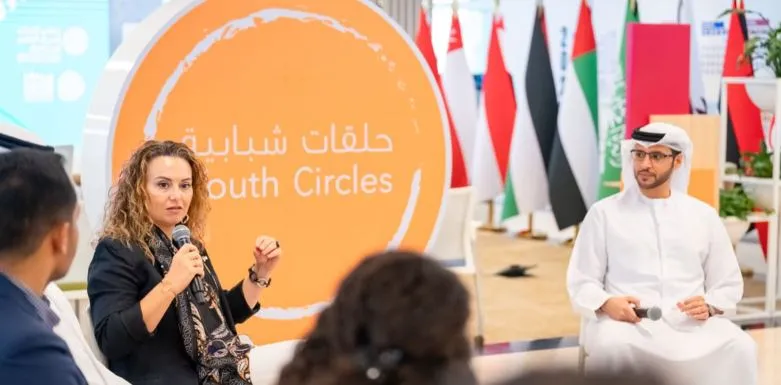The Arab Youth Council for Climate Change, in collaboration with the Federal Youth Authority, has held a youth circle session titled, “Road to COP29: The Importance of Cross-Sectoral Partnerships”, among the second cohort’s training programme.
The session sought to highlight the significance of individual and institutional partnerships in addressing climate change challenges and the role of youth and their community efforts in enhancing sustainability and supporting environmental policies.
The youth circle session featured Khaled Al Nuaimi, Acting Director of the Federal Youth Foundatio, and Bérangère Boëll, United Nations Resident Coordinator for the UAE, and was moderated by Rakan Alonazi, a member of the Arab Youth Council for Climate Change, in addition to the presence and participation of youth and the council members.
During the review of the youth experience at COP28, Khaled Al Nuaimi said, “The participation of youth in COP28 was remarkable, particularly through the Climate Delegates Program, where we witnessed 100 young people participating from various countries around the world, especially from developing that are most affected by climate change. This participation aimed to enhance and activate the role of youth in achieving the sustainable development goals and to increase their understanding of the challenges faced by some countries that cannot fund and find solutions to their challenges without the support of the international COP conference.”
He added, “Youth’s experience at COP28 has helped increase their awareness and effectiveness in facing climate challenges. The Arab Youth Center is organising the Arab Youth Council’s training programme for climate change, with wide youth participation from all Arab countries, to introduce them to the most prominent global challenges and the capabilities that can support the role of youth in contributing to developing appropriate creative solutions during COP29 in Azerbaijan.”
During the session, Al Nuaimi emphasised the importance of youth having a spirit of initiative since opportunities are now available in various virtual and real forms. He encouraged them to seek and strive to make a positive difference, to focus on establishing themselves scientifically and qualifying themselves practically, and to build relationships with their local and international community environment so that they can achieve their future ambitions and the aspirations of their countries within the framework of sustainable development.
Bérangère Boëll, United Nations Resident Coordinator for the UAE, stated, “Achieving the 17 Sustainable Development Goals requires unifying the efforts of different entities in both the public and private sectors, as well as individuals, and activating their role in volunteer work and enhancing youth community contributions in this field.”
She added, “The youth voices grow stronger when discussed with all parties, including individuals and institutions in the society. Therefore, youth must ensure they continue the process of effective research, communication, and listening to decision-makers while acquiring the leadership skills needed to express their views courageously and decisively to ensure successful partnerships with youth.”
The third day of the training forum included brainstorming sessions and interactive workshops presented by experts in the field of climate action and sustainability, who shared their experiences to enhance the skills of council members as Arab leaders in climate action. Among the participants was the Authority of Social Contributions – Ma’an, which highlighted its efforts and services related to voluntary community initiatives for individuals and institutions in Abu Dhabi, including the Al Ain and Al Dhafra regions.
The current training programme, which includes 12 young men and women from 10 Arab countries, provides participants with advanced expertise in the fields of environment, sustainability, and climate change through specialised training materials, scientific and practical studies on inspiring youth initiatives from around the world, as well as field visits to institutions that apply sustainability standards and meetings with leading figures and decision-makers in the climate action sector.

